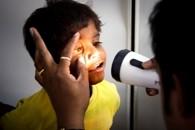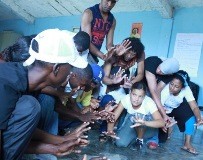Look what we achieved in 2013
As we settle into 2014, MRG and partners recall the highlights of the year that was…

‘This ruling from the African Court is a positive step towards realization of justice for the Ogiek.' Daniel Kobei, Ogiek Peoples Development Program
In an historic decision, the African Court on Human and Peoples' Rights issued a significant ruling in favour of the Ogiek community against the Government of Kenya. It is the first time the Court has issued such an order in favour of an indigenous people, and is indicative of how serious it considers the issues at stake. MRG will continue to work with Ogiek partners as we prepare to challenge the Government of Kenya at the African Court, including at the hearing scheduled for later this year.
‘For my future profession I want to be a lawyer because all the defendants in the trial were black except for my master.' Said – child victim of slavery
MRG's legal cases team continued to support local lawyers in representing Haratine ("slave caste") women and child victims of slavery in Mauritania. The team selects cases that maximize the likelihood of positive precedents in order to make the greatest possible impact on the most deeply entrenched system of slavery in the world.

‘We live in a world of profound health inequalities, a world in which a person's health and the quality of care they receive is determined by their ethnicity, the language that they speak or their religious and cultural beliefs.' Paul Hunt, UN Special Rapporteur on the right to health (2002-2008)
MRG's annual flagship publication, State of the World's Minorities and Indigenous Peoples, tackled the complex issue of access to health for minorities and indigenous peoples. We reported on communities who are in desperate need but are frequently overlooked by health policymakers.

‘I grew up as a minority myself. I tap into that feeling of what it must feel like to not only be different but also discriminated against, alone and unsupported.' Meera Syal
Writer and actress Meera Syal spoke out about against the enslavement of Mauritania's Haratine people on MRG's BBC Radio 4 appeal, raising crucial support for MRG's work in the country.
‘Two years after the revolution and a year after the first democratic elections, I can sincerely say that revolution is draining and democracy is scary.' Sarah El Ashmawy, MRG's Egypt Programme Coordinator
MRG trained Egyptian activists to navigate their way around the enormously challenging political environment they face. They worked together to draft laws protecting religious minorities and put discrimination and sectarian violence on the agenda of Egypt's Constituent Assembly.

‘Civil society organizations across the Americas will be able to draw on these texts for inspiration and support.' Carl Söderbergh, MRG's Director of Policy and Communications
The Organization of American States (OAS) adopted two landmark anti-discrimination Conventions, marking a significant step towards the recognition and protection of the human rights of minorities and indigenous peoples in the Americas. While MRG pointed out their flaws during the drafting process, the Conventions are nevertheless a significant tool for bringing human rights violations against minorities and indigenous communities to light.
‘I learned about how to get issues into the media; it's a challenge to make an issue interesting to them, especially if it's very local.' Media training participant, Vietnam
MRG ran media training events all around the world to increase minority and indigenous partcipants' confidence and skills in engaging with the media. Participants were taught interview techniques, how to hold press conferences and draft press releases, create video content and develop websites – facilitating their active partcipation in the public sphere.
We now had many people including women from our community contesting for elective positions during the last general election.' Chief Grace, Suba County, Kenya
MRG and partners pushed for the representation of marginalized minority communities in Kenya. Partner director and Suba representative, Jennifer Atieno, was appointed Head of the Education Department in Kisumu County and attributed her success to her involvement in our joint programme.
 Street Theatre rehearsals in the Dominican Republic. MRG/Sofia Olins
Street Theatre rehearsals in the Dominican Republic. MRG/Sofia Olins

'Discrimination has been going on for years. I was happy there was room to express what has happened. This was an opportunity for us to say to the majority population what is happening to us.' Community actor, Street Theatre Programme
MRG worked with partners in the Dominican Republic to train groups of actors who developed plays about racism and performed them for the general public. The programme aims to empower Dominico-Haitian people to speak out for their rights and challenge discriminatory views in the wider community.
Thank you for continuing to follow and support MRG's work. If you would like to make a donation in support of our work with minorities and indigenous peoples around the world, please click here or contact us at [email protected] or +44 (0) 207 422 4200